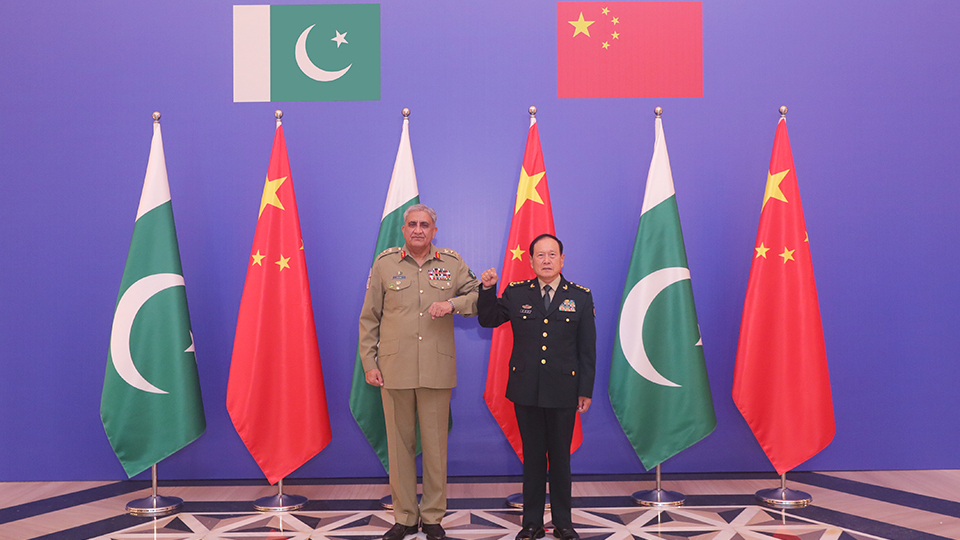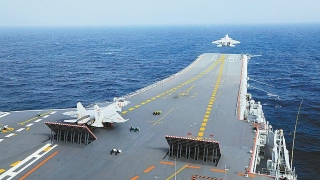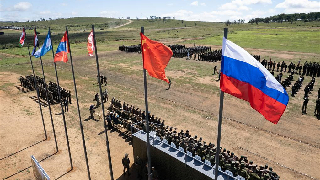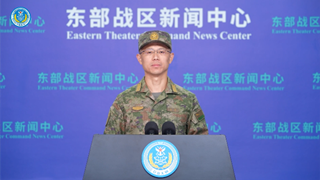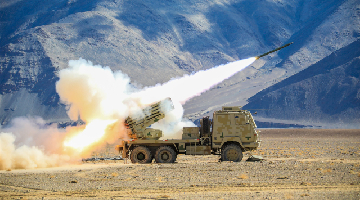By Zhang Jiadong
张家栋
In the history of international politics, the domination of a few countries over world politics is often transient and unsustainable. In terms of the West as a whole, it has dominated the world for more than 500 years, a rather long time in human history. In terms of sovereign states like Spain, the Netherlands, the UK and the US, the US has dominated world politics for nearly 100 years, the second longest after the old British Empire.
在国际政治史上,少数国家主导世界政治的现象总是短暂、难以持久的。如果把西方视为一个整体的话,它主导世界已经500多年,算是人类历史上一个非常长的周期了。如果以西班牙、荷兰、英国和美国这些主权国家为单位来看,美国主导世界政治也近100年,已经是仅次于当年大英帝国的第二大世界性帝国了。
The challenge to America’s domination in the 20th century and the first decade of the 21st century comes from within the West, which in the broad sense includes the Soviet Union, Germany, and Japan. During the Cold War, the West was split into two blocs, one headed by the Soviet Union and the other by the US, while countries like China and India belonged to the Third World whose relation with both blocs was unstable. As America’s rival, the Soviet Union in a way consolidated the alliance between the US, Japan and Europe, which gave Germany and Japan strategic opportunities after WWII.
在整个20世纪和21世纪前十年,美国主导地位面临的挑战,其实主要是来自西方内部的挑战。无论苏联还是德国和日本这些国家,广义上都可以归属为西方国家。冷战时期,西方内部分为各自以苏联和美国为首的两大阵营,中国、印度等总体上属于第三世界,与两大阵营的关系都不稳固。苏联虽然是美国阵营的对手,但也从外部巩固了美日欧之间的同盟关系,使德国和日本在二战后获得战略机遇。
After the end of the Cold War, the world regained peace under American rule, but has also brought itself another crisis as, with the disappearance of a common threat, the global values were no longer able to resist the revolutionary pressure stemming from the adjustment of the international landscape. From the 80s to the 90s of the last century, Japan and European countries were on a constant rise while the US was on a relative decline. In 1995, Japan and Germany had a combined GDP larger than America’s. Under such circumstances, they were moving increasingly away from the US and dared to say “no” to it more often. When the financial crisis broke out in 2008, the West’s global position suffered a serious blow, and so did America’s leadership within the western hemisphere. In Asia, on the contrary, Southeast Asian countries, Japan, ROK and China were growing ever closer in economic and trade ties. In Europe, Germany and France had widening divergences on the Russian issue, with French President Macron claiming NATO is “brain dead”. America itself felt lost too, as people represented by former President Trump began to lose confidence and interest in maintaining American hegemony.
冷战结束以后,美国领导下的世界秩序获胜,但在实现“美国治下的和平”的同时也给自己带来危机。在失去共同威胁的情况下,价值观基础已经无法对冲国际格局调整带来的革命性压力。从上世纪80年代到90年代,日本和欧洲国家不断上升,美国开始相对意义上的节节后退。到1995年,日本加上德国GDP总量已经大于美国。在这种情况下,日本和德国对美国的离心力有所上升,向美国说“不”开始增多。到2008年国际金融危机爆发时,西方在世界上的地位受到削弱,美国在西方内部的领导力也相应地被削弱。在亚洲,东南亚国家、日本、韩国和中国相互之间经贸联系日益紧密。在欧洲,德国和法国在俄罗斯问题上的分歧越来越大。法国总统马克龙甚至一度直接高喊“北约已经脑死亡”。美国自己也有所迷失,特朗普总统代表的一派开始对继续维持美国霸权地位失去信心和兴趣。
The world was displaying three major changes in this stage. First, the relationship between China and the US-led West began to change with China’s high-speed development, as the West, primarily the US, has found a new weighty imaginary enemy. Second, changes were brewing within the West. Japan and Germany began to go down in the 21st century. With a combined GDP of less than half of America’s around 2017, Japan and Germany no longer dared to say no to the US like in the 1990s. Third, the tension between Russia and the West aggravated, which this year evolved into the most serious military conflict on the European continent after WWII.
但在这一阶段,世界也出现另外三大变化:一是随着中国快速发展,中国与美西方的关系发生变化。西方主要是美国重新找到“一个有分量的假想敌”。二是西方内部发生变化。日本与德国等在21世纪开始相对衰落。到2017年前后,日本加德国的GDP已经不足美国的一半,无力再像上世纪90年代那样对美国说“不”。三是俄罗斯与西方的关系进一步激化,到今年演变成二战后欧洲大陆上最严重的一场军事冲突。
This has affected the US on different levels. Regarding the global order, the so-called challenge from China and Russia put an end to its assumption of having universal values. The US-led global system shriveled into the Western system, and Washington is no longer trying to establish a world order inclusive of China and Russia. In other words, America has retreated from its self-claimed position as a world leader to a Cold War-style position as leader of the Western hemisphere, with its strategic goals and the peace under American rule all contracting. On the regional level, China’s rapid development and rising position are hyped up by the US and other western countries as a “threat” in order to cement their alliance with Japan and ROK. In Europe, the challenge from Russia has given NATO a refreshed sense of existence. The persistent strategic divergences between Germany and France on the Russian issue are temporarily outweighed by their common wish to “protect Ukraine’s sovereignty and territorial integrity” and “safeguard the current international order”. The joining of Sweden and Finland has enhanced NATO’s geographical advantages.
这对美国在不同层面产生不同影响:在世界秩序层面,来自中国和俄罗斯的所谓“挑战”终结了美国对自身价值观体系的普世性假设。美国领导的世界体系退变为西方体系。美国不再试图建立一个可以包容中国与俄罗斯的世界秩序。换而言之,美国从世界领导者的自我定位后退为西方世界领导者的冷战式定位,美国的战略目标以及“美国治下的和平”都自我瘦身了。在地区层面,中国的快速发展和地位上升被美国等西方国家渲染炒作为“威胁”,用以巩固美国与日本、韩国等盟友的关系。在欧洲,俄罗斯的“挑战”则让北约重新找到自己的存在价值。德国、法国在俄罗斯问题上长期存在的战略分歧,在“保护乌克兰主权和领土完整”“保卫现行国际秩序”的新基础上,被暂时弥合了。瑞典和芬兰的加入,进一步扩大了北约的地理优势。
If, as the extreme political elites in America imagine, the world can be redivided into two blocs – China and Russia VS the US, Japan and EU – following the Cold War model, that would be considered good news by Washington for America’s strategic position. Establishing political and military alliances and besieging and containing strategic rivals are what the US is good at. But China and Russia are not the Soviet Union, and China, in particular, is closely entwined with the international market and the Western system. America’s attempt to isolate China and marginalize it in the existing international system won’t succeed.
如果按照美国极端政治精英设想的那样,世界格局可以重新按照冷战模式划分成中俄对美日欧两大阵营的话,那将被华盛顿认为是有利于美国战略定位的“好消息”。建立政治军事同盟体系,围剿战略竞争对手,正是美国擅长的事。但是中国和俄罗斯都不是苏联。尤其中国,与国际市场、西方体系有着密切联系,美国试图孤立中国、把中国从现行国际体系中挤出去的图谋是不可能成功的。
This means that the new alliance system that the US has in mind with China and Russia as the imaginary enemies is essentially a loose system of values rather than an all-around alliance system encompassing values as well as political, military and economic aspects like during the Cold War. Compared with the Cold War system, the new alliance system is different in the following ways. For one thing, the members of the alliance have misaligned goals in different areas. While the US-led allies have somewhat shared goals in values and the military field, they all aim for different things in other fields. For another, America’s leadership is unbalanced in different fields. Its military domination is most secure, but military forces play a much smaller role in the new strategic game than in the Cold War. In comparison, its leadership in other fields is generally weak, so much so that it has to make concessions to the allies from time to time.
这意味着美国试图以中俄为假想敌建立的新同盟体系,其实是一个松散的价值观体系,不是冷战时那种包括价值观、政治、军事和经济在内的全方位同盟体系。这个同盟体系与冷战体系相比:一方面,同盟成员在不同领域的目标不同步。在价值观和军事领域,美西方同盟的目标较为一致。但在其他领域,不同成员则有不同目标,步调不一。另一方面,美国在不同领域的领导权不平衡、不一致。美国在军事领域的主导权最为稳固。但在这场新战略博弈中,军事力量所能发挥的作用将远远不如冷战时期。在其他领域,美国的领导地位经常是薄弱的,有时还要向自己的盟友做出让步。
In this complex game, Japan and Europe try to rely on the US as the main strategic backing to compete with China and Russia for domination in Europe and East Asia, but at the same time, those countries are demanding from the US more political power on the international stage. As a result, even if the US succeeds in strategically containing China and Russia and its alliance system is reaffirmed in the short term, it is unable to ever put Japan and Germany back in the cage again. At the moment, Germany, France and the US are all trying hard to pull India to their side, and European countries are acting more like China than the US regarding the economic and trade relations with Russia. This fully indicates that America’s new round of strategic attacks against Russia and China is precariously grounded, and this new alliance system would soon collapse once the members think they have achieved the short-term goals.
在这场复杂博弈中,日本与欧洲试图以美国为主要战略助力同中国和俄罗斯进行某种博弈,以竞争欧洲和东亚秩序的主导权。但与此同时,这些国家也在同盟体系内部向美国索取更多的国际政治权力。这样一来,美国即使实现了战略上围攻中国和俄罗斯的目标,同盟体系短期内重新巩固,但也将无法再把日本和德国“关回笼子”。到目前为止,德国、法国包括美国都在极力拉拢的印度,在对俄罗斯的经贸问题上都表现得“更像中国”而不是像美国。这一现象充分说明,美国这一轮对俄罗斯和中国的战略围攻,基础是非常狭窄的。一旦被认为实现了相关短期目标,这一体系就可能会迅速解体。
In short, the world has come onto the track of globalization and democratization of international relations. In this process, America’s dominant position should have been continuously deconstructed, but some unexpected events have given it a chance to re-rally the alliance and re-build its hegemony, but that has also given countries like Japan and Germany a chance to seek a “normal status” or strategic independence. It’s hard to say whether, after this round of gaming, the US will re-emerge as the world’s only superpower or continue to go down the hill, but the possibility for Japan and Germany to have more strategic independence will send new structural shocks across the international landscape and the post-WWII order, including within the Western bloc. That may either lead to new chaos or even warfare or offer a new opportunity for human society to go further toward multi-polarity.
简而言之,这个世界已经走在全球化和国际关系民主化的道路上,美国的霸权地位本来是不断被解构的。一些突发事件,虽然给了美国重整同盟体系、重振霸权地位的机会,但也给了日本和德国等国家谋求“正常国家”地位或追求战略自主的机会。这一轮大博弈后,美国是恢复“一超”的强大还是继续相对衰落,仍有不确定性。但日本和德国等可能将拥有更大的战略自主权,这将会给国际格局和二战后秩序,包括西方阵营内部,带来新的结构性冲击。这既可能导致新的混乱甚至战乱,也有可能是人类社会进一步迈向多极化时代的一个新契机。
(The author is a professor at the Center for American Studies, Fudan University)
(作者是复旦大学美国研究中心教授)
Editor's note: Originally published on huanqiu.com, this article is translated from Chinese into English and edited by the China Military Online. The information and opinions in this article do not necessarily reflect the views of eng.chinamil.com.cn.
